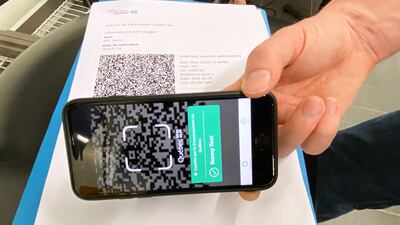In the Canadian province of Quebec, about 90 per cent of the eligible population has had at least one dose of the Covid-19 vaccine. But the provincial government says that’s not enough.
As Quebec battles yet another wave of Covid-19, this time caused by the Omicron variant, the province has enacted a series of controversial mandates.
On Tuesday, Quebec’s Premier Francois Legault said he would impose a health tax on unvaccinated adults without medical exemptions.
“We’re looking for a health contribution for adults who refuse to be vaccinated for non-medical reasons,” Mr Legault said at a press conference.
The “health tax” has sparked an outcry among many in Canada’s second largest province with some questioning its legality.
“It's clearly a violation of the Canadian Charter,” said Julius Grey, a leading constitutional expert in Quebec.
But Mr Grey said the government would still have a strong case because the charter allows for “reasonable limitations".
He argued that if the virus had a 50 per cent mortality rate, there would be no issue, and the government would be well within its rights to enact the “health contribution".
“I personally consider it a close call,” he told The National.
The proposed tax comes after the province announced a series of restrictions and mandates would start this year.
Alcohol and cannabis restrictions
Last week, the province announced that starting on January 18, all adults wishing to purchase alcohol and cannabis from government stores would have to show proof of vaccination.
“We must do everything to limit the impact on our staff and on our very fragile health system,” said Christian Dube, Quebec’s minister for health and social services.
“We must therefore reduce the number of cases and limit hospitalisations as much as possible.”
The French language newspaper La Presse reported that vaccination rates quadrupled following the implementation of the mandate.
Quebec is not alone — across Canada, federal and provincial governments have taken steps to prevent the spread of the virus, which has killed more than 30,000 people in the country.
Canada’s land border with the US was closed for a year and a half, and although the border is now open, those wishing to enter Canada are required to show proof of vaccination and a negative PCR test taken within 72 hours of entry.
Keep on truckin'
On Thursday, the federal government confirmed that all lorry drivers wishing to enter the country must also provide proof of vaccination.
Though the border with the US was previously closed to non-essential travel, it remained open to lorry drivers, who provide vital services to both countries.
About 30,000 lorries rumble across the US-Canada border every day, carrying an estimated $1 billion in goods.
There are concerns that the move to require proof of vaccination could put further strain on fragile supply chains.
The Canadian Trucking Alliance said the mandate would affect between 10-15 per cent of the 120,000 drivers who cross the border frequently.
Vaccine passports
The federal government has also introduced a nationwide “vaccine passport”, allowing Canadians to easily show proof of vaccination. Nearly every province and territory has some form of its own passport.
Prime Minister Justin Trudeau has been vocal in his support of vaccines and has strongly rebuked those who have decided not to take the shot.
“When people are seeing cancer treatments and elective surgeries put off because beds are filled with people who chose not to get vaccinated, they’re frustrated,” he said.
Canada has relatively high rates of vaccination, with 83 per cent having received a first shot and more than 77 per cent having received both doses.
But cases and hospital admissions have been increasing across the country during the latest wave.


